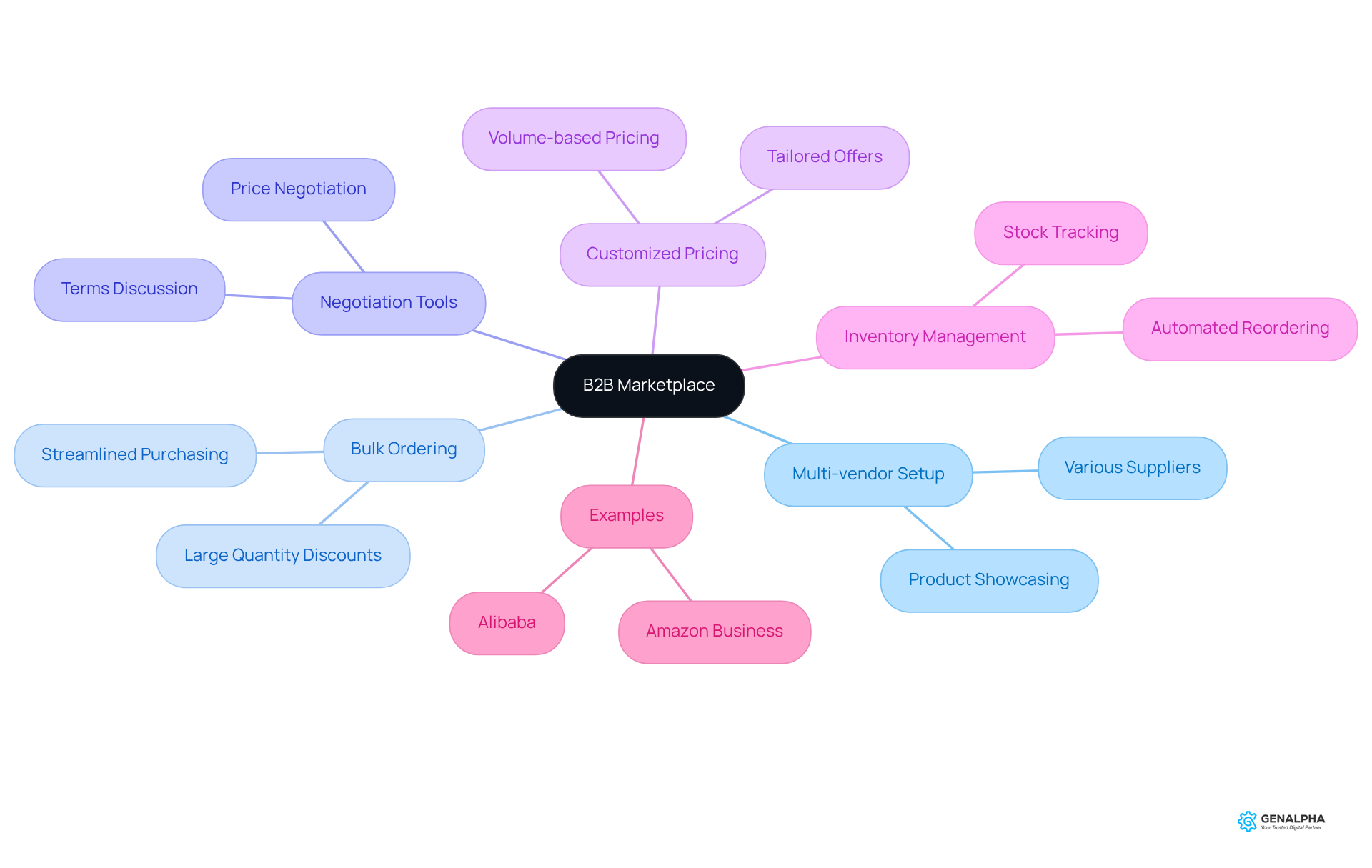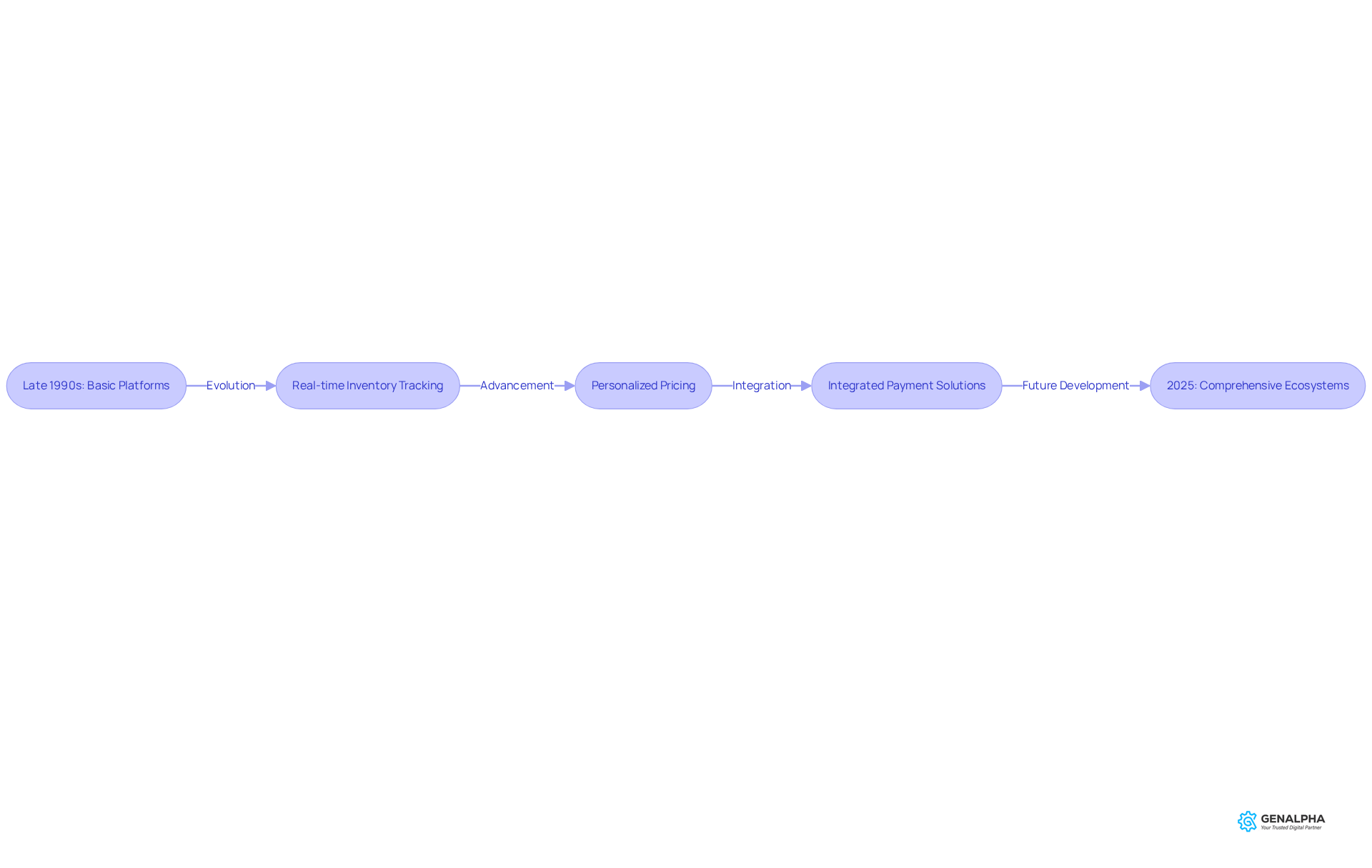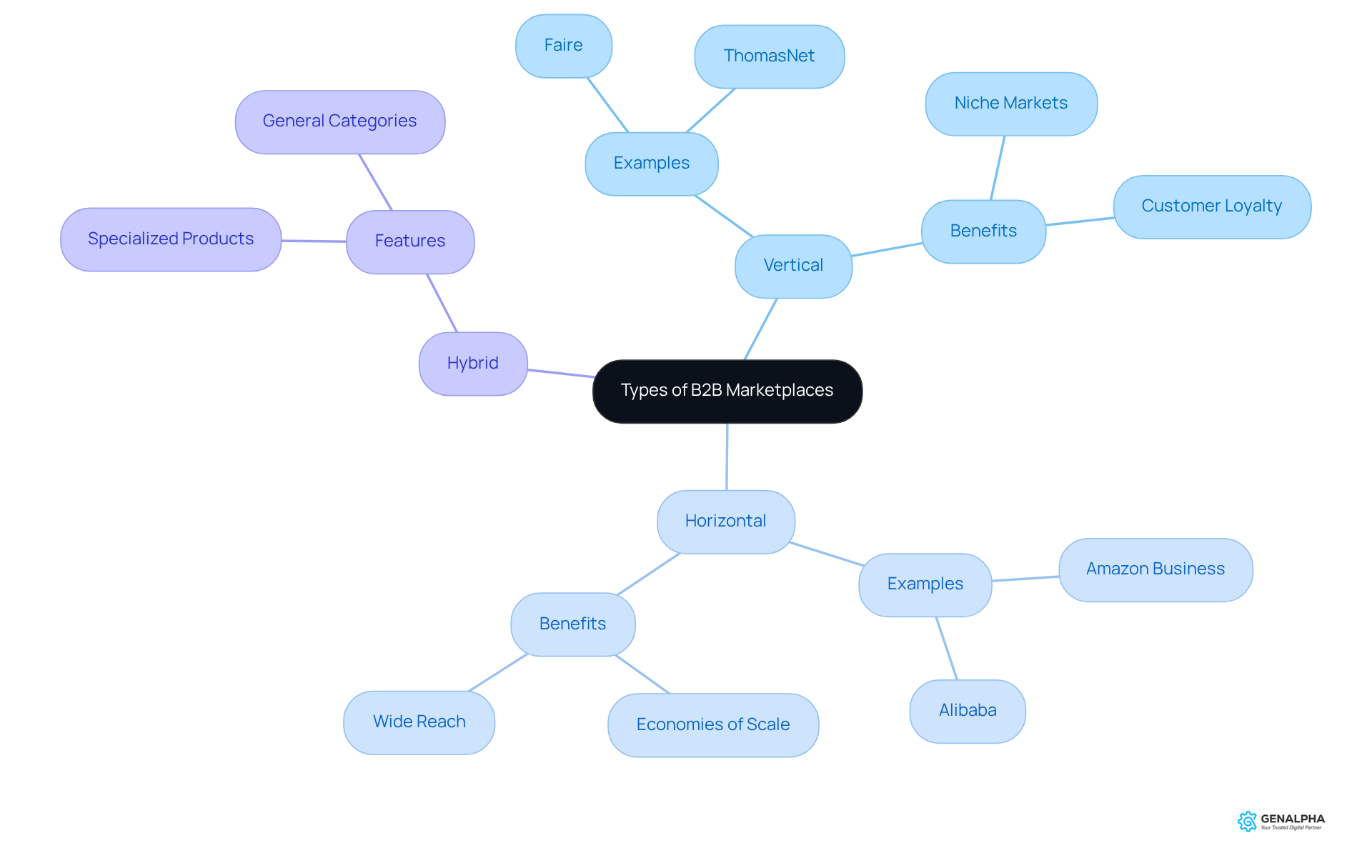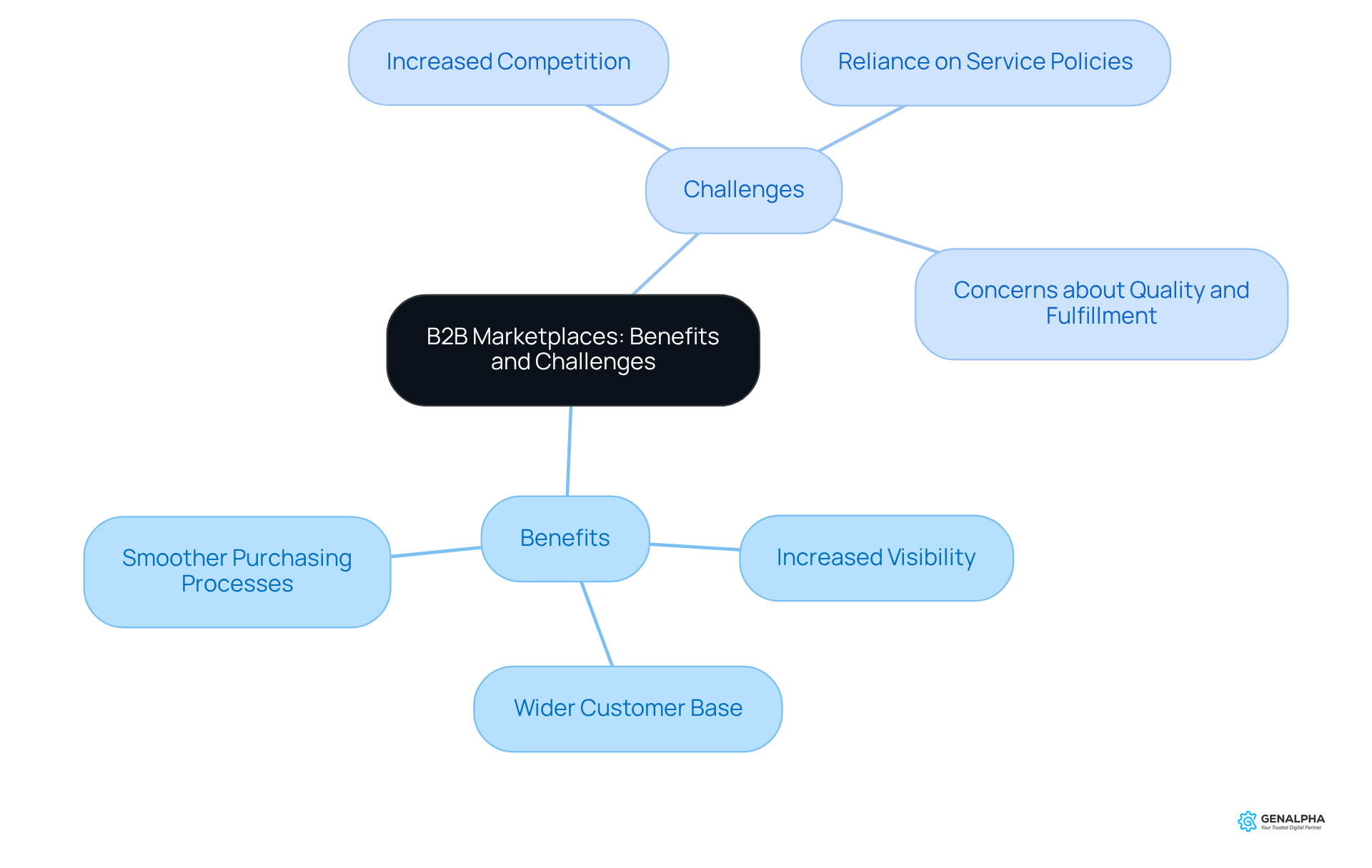Overview
Have you ever wondered what makes B2B marketplaces so special? This article dives into the different types and benefits of these platforms, showcasing their unique traits and the perks they bring to businesses. B2B marketplaces can be vertical, horizontal, or hybrid—each one tailored to meet specific purchasing needs.
Let’s talk about some of the fantastic benefits!
- Increased visibility
- Streamlined processes
These are just a couple of the advantages that can really help businesses thrive. However, it’s not all smooth sailing; challenges like competition and reliance on service quality are important to consider, too.
So, what do you think? Are B2B marketplaces something your business could benefit from? Let's explore this together!
Introduction
The landscape of B2B commerce is really changing, thanks to the rise of specialized online marketplaces that connect businesses in exciting new ways. These platforms not only make purchasing easier but also give access to a wide range of suppliers and products, boosting efficiency and visibility.
But with these opportunities come some challenges, like increased competition and the need to navigate service policies strategically.
So, what does this mean for businesses aiming to thrive in this evolving marketplace? By exploring the types, benefits, and hurdles of B2B marketplaces, we can uncover valuable insights that empower companies to enhance their online sales strategies.
Define B2B Marketplace: Key Characteristics and Functions
Have you ever wondered where companies utilize a marketplace for B2B to buy and sell goods or services to each other? That’s where the marketplace for B2B comes into play! Unlike those B2C platforms that cater to individual shoppers, a marketplace for B2B focuses on transactions between businesses.
These platforms act as a marketplace for B2B, featuring cool options like multi-vendor setups that allow various suppliers to showcase their products. Plus, they often include tools for bulk ordering, negotiation, and even customized pricing. Imagine how much easier it is for companies to manage their purchases with features like inventory management, order processing, and payment solutions all in one place!
For instance, consider Alibaba and Amazon Business as leading examples of a marketplace for B2B. They connect manufacturers, wholesalers, and retailers in a seamless digital environment. Isn’t it fascinating how these platforms enhance the purchasing process for companies? If you’re in the B2B space, exploring these platforms could be a game-changer for your business!

Explore the Evolution of B2B Marketplaces in Digital Commerce
Remember the early days of e-commerce back in the late 1990s? That’s when businesses first dipped their toes into online sales channels. Initially, B2B platforms were pretty basic—just cataloging items and enabling transactions. But guess what? As technology advanced, so did these platforms! Features like real-time inventory tracking, personalized pricing, and integrated payment solutions turned them into comprehensive ecosystems.
Fast forward to 2025, and we’re looking at a marketplace for B2B platforms that are making a significant impact on global trade. Why? Because there’s a growing demand for efficiency and the rise of digital-first strategies. Isn’t it exciting to think about how far we’ve come and where we’re headed? Let’s keep an eye on these developments—they’re shaping the future of business as we know it!

Identify Types of B2B Marketplaces: Vertical, Horizontal, and More
When we think about the marketplace for B2B platforms, it's helpful to know they come in two main flavors: vertical and horizontal. Each type plays a distinct role in the business world. Vertical platforms zoom in on specific industries or product categories, connecting specialized suppliers with buyers. For instance, take Faire, which is all about wholesale fashion, or ThomasNet, which caters to the industrial sector. These platforms help businesses tap into niche markets, often leading to stronger customer loyalty and smoother operations. They really specialize in meeting the unique needs and expectations of their clients, making them effective in addressing specific market demands.
On the flip side, we have horizontal platforms that offer a wide variety of products across different industries, appealing to a larger audience. Think of Amazon Business and Alibaba; they provide extensive product selections that meet various business needs. This approach allows companies to enjoy economies of scale and reach a broader customer base, but it does come with its challenges, like higher customer acquisition costs and stiffer competition. Interestingly, studies show that omnichannel consumers spend about 20% more than those sticking to a single channel. This highlights the potential financial perks of engaging with both vertical and horizontal platforms.
Then there are hybrid platforms, which blend elements from both vertical and horizontal models. They offer specialized products alongside general categories, allowing companies to harness the best of both worlds. This strategy can boost customer engagement and operational efficiency. As Evgenia Khimich points out, horizontal platforms often suit small or medium-sized enterprises and startups that might not have the capital, personnel, or resources to manage extensive web development on their own.
As the B2B landscape continues to evolve, understanding these differences becomes crucial for manufacturers and distributors aiming to succeed in the marketplace for B2B and enhance their online sales strategies. So, which platform suits your business needs best?

Analyze Benefits and Challenges of B2B Marketplaces for Businesses
B2B marketplaces are pretty amazing, right? They come with a bunch of benefits like:
- Increased visibility
- Access to a wider customer base
- Smoother purchasing processes
Imagine being able to connect with tons of buyers all through one platform—this can really boost your sales opportunities! Plus, B2B eCommerce cuts out the middlemen, speeding up procurement processes, which is super important for keeping things efficient.
But, it’s not all smooth sailing. There are challenges too, like:
- Increased competition
- Reliance on service policies
- Worries about product quality and fulfillment
Companies really need to navigate these hurdles carefully to make the most of what B2B platforms offer while keeping risks in check. Take, for instance, a manufacturer who faced delays in fulfillment due to platform restrictions. This just goes to show how crucial it is to understand these challenges.
Also, did you know that B2B sellers spend about 72% of their time on non-selling activities? That’s a lot of time wasted! Tackling these inefficiencies is key. To truly reap the rewards of the marketplace for B2B, businesses should strategically address these risks. This way, they can maximize their advantages in online transactions while still maintaining quality and service standards. What steps are you taking to navigate these waters?

Conclusion
The marketplace for B2B transactions is a vital part of modern commerce, making interactions between businesses smoother and more efficient. Unlike traditional consumer-focused platforms, B2B marketplaces cater specifically to the unique needs of companies, offering tools and features that simplify procurement processes. As more businesses embrace digital solutions, it’s essential to understand the nuances of these marketplaces to optimize operations and enhance sales strategies.
Throughout this exploration, we’ve uncovered key insights about the evolution, types, and benefits of B2B marketplaces. From the early days of basic online catalogs to today’s sophisticated platforms with real-time inventory tracking and personalized pricing, these marketplaces have undergone significant transformations. Additionally, distinguishing between vertical and horizontal platforms reveals the diverse strategies businesses can adopt to maximize their reach and efficiency. While the advantages include increased visibility and streamlined purchasing, it’s important to navigate challenges like heightened competition and quality concerns carefully.
Given the evolving landscape of B2B commerce, it’s crucial for businesses to thoughtfully assess their marketplace strategies. By leveraging the benefits of B2B platforms while being mindful of potential pitfalls, companies can position themselves for success in an increasingly digital marketplace. Engaging with the right type of platform not only enhances customer relationships but also drives growth and innovation in today’s competitive business environment.
So, are you ready to take a closer look at your marketplace strategy and see how it can work for you?
Frequently Asked Questions
What is a B2B marketplace?
A B2B marketplace is a platform where businesses buy and sell goods or services to each other, focusing on transactions between companies rather than individual shoppers.
How does a B2B marketplace differ from B2C platforms?
Unlike B2C platforms that cater to individual consumers, B2B marketplaces facilitate transactions specifically between businesses.
What are some key features of B2B marketplaces?
Key features of B2B marketplaces include multi-vendor setups, bulk ordering options, negotiation tools, customized pricing, inventory management, order processing, and integrated payment solutions.
Can you provide examples of B2B marketplaces?
Examples of B2B marketplaces include Alibaba and Amazon Business, which connect manufacturers, wholesalers, and retailers in a digital environment.
How do B2B marketplaces enhance the purchasing process for companies?
B2B marketplaces streamline the purchasing process by consolidating various functionalities, making it easier for companies to manage their purchases efficiently.




